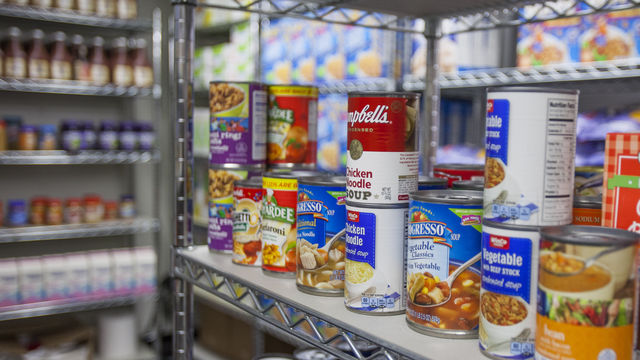As the University of Utah’s Class Sizes Grow, the Feed U Pantry Hopes to Keep Up
August 29, 2019
In October 2014, the University of Utah unveiled the Feed U Pantry, accessible to all students, staff and faculty with a valid uID. Almost five years later, the pantry is still growing and working to sustain the largest class the U has seen yet.
What is the Feed U Pantry?
The Feed U Pantry is part of the Union Programming Council, a student-led organization with several boards — including Crimson Nights — that primarily focuses on event planning and providing support to students.
The Feed U Pantry is almost entirely volunteer run and operates mostly on donations. It offers non-perishable food (non-expired, unopened, individually packaged and labeled items), hygiene items (usually in travel sizes) and some perishable food options, like fruits, vegetables, bread and more. Anyone with a valid uID can access the pantry, whether in person or through their website, as long as they are in need of food assistance, no matter if it is only a few days or for an extended period of time. The Pantry estimates that in the last year, it has connected nearly 5,000 students, faculty and their families to resources that they need.
Partnerships, On and Off Campus
Much of the support and the donations that keep the Pantry stocked year-round come from its various partners across campus and the Salt Lake Valley. The Feed U Pantry functions as a partner agency of the Utah Food Bank, which is also its primary off-campus partner. The UFB periodically ships a variety of donations that they receive directly to the U, who distributes them accordingly. The partnership is forming again this year, as the campus’ population grows to its largest size yet.
“Our partnership with the Utah Food Bank began about two years ago and then dwindled out because there wasn’t as much of a need for deliveries from them. We were fairly satisfied with the supplies we had and donations from across campus and different food drives,” said Ben Chenot, a biology student at the U and new director of the Feed U Pantry. “We found that as we increased marketing and our volunteer numbers, we’re expanding our reach and moving a lot more food out. We just reignited the partnership, and are officially starting working together again later this month, Aug. 2019.”
This newly restarted partnership will have the UFB shipping food to the Feed U Pantry on a rough schedule every other month. The Pantry is not able to request certain foods or items from the UFB — rather, the UFB brings what it has or is able to offer and the Pantry accepts, what Chenot calls “the luck of the draw.” The Pantry’s volunteers then move the food into the stock room or put it directly on the shelves if needed.
The Edible Campus Gardens
On campus, the Feed U Pantry has established relationships with groups and organizations like the Edible Campus Gardens and the Food Recovery Network, all with similar missions to keep students on campus well-nourished and safe with access to healthy foods year round.
“We’re partnered with a lot of organizations around campus,” Chenot said. “Many groups were very passionate about our work and helping out, and the good news is that we always have room for more hands, whether through donations or volunteers. We all realize that 33 percent of college students face some sort of food insecurity, and applying that statistic to the U’s numbers, see that around 10,000 students struggle with this issue. These numbers are also before taking into account the amount of students and faculty that support their families, which increases the likelihood of food insecurity, and makes the work even more important.”
These organizations do a lot of work outside of their partnerships with the Feed U Pantry, but contribute during different points of the year. The Edible Campus Gardens, for example, has two locations on campus: one just east of the Simmons Pioneer Memorial Theatre, near the S.J. Quinney Law School, and another near the Sill Center, behind the A. Ray Olpin Union Building. They host classes, encourage students to volunteer to plant and harvest, and offer free fruits and veggies in the Union building between 11 a.m. and 12 p.m. each Friday outside of their donations to the Pantry.
“Near the beginning of the Pantry, the connection between Edible Campus Gardens and the Pantry was formed, and it has stayed incredibly close,” Chenot said. “They donate fresh produce from their gardens and drop it off at our Pantry, so our clients can have access to healthy, fresh foods. We typically get a lot of ramen, mac and cheese and things of that sort, so working with them has been a great way to help connect our clients to more fruit and vegetables. We have a fridge in the Pantry that can store these items.”
The “To Go Bag” Service
Students may come to the Pantry itself and browse for the foods and items they need, or the Pantry also offers a “To Go Bag” service. Students can fill out a four-page form on the Pantry’s website, including their first and last name, uID and email and request items from pie filling to pinto beans, free of charge. Orders can contain multiple bags and a large variety of food, all without judgment or stress. Volunteers at the Pantry receive these online form requests and go through the Pantry and fill up bags, much like online grocery shopping deliveries at Smith’s or Walmart are conducted.
Once the orders are filled, these bags can be picked up at the front desk of the Union during the hours the Union itself is open, regardless of whether the Pantry is open, with a valid uID. Clients have about a week to pick up their order before the food is restocked. Chenot says this service is offered for the convenience of students, staff and faculty, but also as a way to reduce the stigma and possible embarrassment that comes with food insecurity.
“There were times during my undergrad that I faced a lot of stress and didn’t have enough money to meet my bills and feed myself,” said Mohan Sudabattula, a student majoring in Honors Health Society & Policy. “Although I was reluctant at first, I sought out help from the Feed U Pantry. The way it was run really made me feel comfortable approaching the staff, and made the whole experience empowering. I felt like I had more control. The variety of options that the Pantry had ranged from breakfast cereals, cookies, crackers and peanut butter to fresh produce from the Edible Campus Gardens. I took just what I needed for that night but was always told that I was welcome back to get food again the very next day if I needed. I did not feel judged or like I was putting anyone out, which is the same feeling that made it so hard for me to ask for help to begin with. More students, staff and faculty that are able to should utilize this resource and not worry about being judged or facing any type of retaliation for asking for help.”
The First Time Visitor Form
New visitors to the Pantry are asked to fill out a “First Time Visitor Form,” which asks for monthly income estimates, household type, how long food assistance is estimated to be necessary and more.
“We require the form to be filled out before anyone can access the Pantry. The First Time Visitor Form is based on our partnership with Utah Food Bank, who requires us to maintain certain data sets and information about our clients. It’s important to note that we do not discriminate financially whatsoever — there is no maximum income for clients to hit where they could no longer use the Pantry. The questionnaire is for data collection purposes only, and is regulated by the Utah Food Bank through the partnership. All of our volunteers are trained so that when a new visitor is filling out that form, they can make the visitor feel comfortable and assure them that the information given will not be used to gatekeep or discriminate, or be otherwise sold, advertised or given out to other entities.”
The Pantry is located in the basement of the A. Ray Olpin Union Building, near the Computer Lab and Dining Services offices. It is open Monday through Friday, with hours generally in the mornings. Last semester, however, the Pantry was able to operate for around 40 hours per week due to increased volunteers. As the campus has grown exponentially with the newest incoming class, the Pantry is asking for even more volunteers who can help keep the Pantry open for longer hours throughout the week. The Pantry also accepts monetary donations through the U’s Development Office.
For more information about when the Pantry is accessible, how to get involved, what to donate, or when to volunteer, visit their website, contact the director of the Feed U Pantry, Ben Chenot, at [email protected], or visit the Pantry’s physical location.








